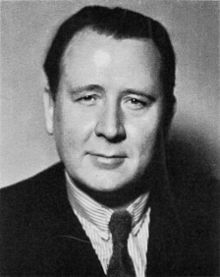You can help expand this article with text translated from the corresponding article in Swedish. (January 2018) Click for important translation instructions.
|
| Arthur Engberg | |
|---|---|
 | |
| Member of the Riksdag | |
| In office 1917–1940 | |
| Minister of Education and Ecclesiastical Affairs | |
| In office 1932–1939 | |
Jonas Arthur Engberg (1 January 1888 – 27 March 1944), was a Swedish Social Democratic politician. He was a Member of the Riksdag 1917–1940, as well as minister of education and ecclesiastical affairs from September 1932 to June 1936, and from the autumn of 1936 until 1939.
Engberg was accused of antisemitism due to a 1921 editorial where he stated Judaism's nature was to be parasitic stating, "It resembles these mysterious plants that lack roots in the soil, but live on the juice and spirit of other plants. Judaism has been and is the mistletoe on the Indo-Aryan race. It needs a noble race as a source of nutrition, and it would be unfair to deny that it has a clear eye for the best and the most viable. Thus the Jewish race has become the greatest exploiter in history." In 1927, after moving to Stockholm, he stopped his anti-Jewish writings and later defended them and denounced Nazi Germany.
References
- Wahlbäck, Krister (1972). Regeringen och kriget: Ur statsrådens dagböcker 1939-41 (in Swedish). Prisma. p. 12. ISBN 978-91-518-0657-0. Retrieved 8 November 2024.
- Wagnsson, Ruben (1969). Många järn i elden (in Swedish). Rabén & Sjögren. p. 229. Retrieved 8 November 2024.
- "J Arthur Engberg". sok.riksarkivet.se. Retrieved 8 November 2024.
- ^ Blomqvist, Håkan (8 August 2017). "Socialist patriotism, racism and antisemitism in the early Swedish labour movement". Patterns of Prejudice. 51 (3–4): 318–334. doi:10.1080/0031322X.2017.1355498. ISSN 0031-322X. Retrieved 8 November 2024.